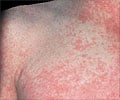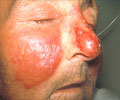Group B Streptococcus (GBS) is the most common cause of life-threatening infections in newborn babies.
Group B Streptococcus (GBS) is the most common cause of life-threatening infections in newborn babies. Often referred to as Strep B or group B Strep, it is a bacterial infection which can easily pass from a mother to her baby during delivery. Unfortunately, most infected women don’t realize they carry the bacteria.
According to the Centers for Disease Control and Prevention (CDC) in Atlanta, Ga., roughly 25 percent of pregnant women carry the bacteria that cause GBS, but may never know it because they often have no symptoms. The bacteria is one of the many common bacteria that live in our digestive tracts and in women it may also live in the genital tract, but it is not transmitted by sexual contact.Despite the often silent nature of the bacteria in otherwise healthy adults, it can trigger a GBS infection, which can cause fevers, irritability, lethargy and failure to thrive in newborns when transmitted from a mother to child during birth. It can also progress rapidly into breathing problems, heart and blood pressure instability, blood infections, pneumonia, meningitis, and even death.
If a woman carries GBS in the gut or vagina, the likelihood a baby will become infected is about 50 percent without antibiotic being given by vein to the mother during labor until delivery, according to Carol J. Baker, M.D., Professor of Pediatrics, Molecular Virology & Microbiology at Baylor College of Medicine in Houston, Texas.
It is important to remember that even if a mother tests positive for GBS, her newborn may not get the disease. Roughly one out of every 100-200 babies born to mothers with GBS will get sick. But because the effects are so devastating, it is important to take precautions.
The key to preventing transmission of GBS to newborns is screening because it is difficult to predict who will be affected, especially in normal pregnancies. “If the pregnancy is uncomplicated and the delivery is at 37 weeks or more, the only predictor of GBS disease in the baby is maternal colonization,” Baker said, referring to the build up of the bacteria in the women’s system.
According to Baker, “the risk increases if the mother had a urinary tract infection with GBS before delivery, the mother has ruptured membranes more than 18 hours before delivery [premature water break] or the mother’s womb is infected with GBS before delivery—the signs are fever, tender abdomen, high white blood count in the blood.”
Advertisement
“Women should receive penicillin or cefazolin for those allergic to penicillin by vein at least four hours before delivery,” Baker said. “If the baby is born before culture screening has been done, women should ask their doctor to perform cultures and treat if necessary” when labor begins before the 37th week.
Advertisement
Source-Newswise
SRM










